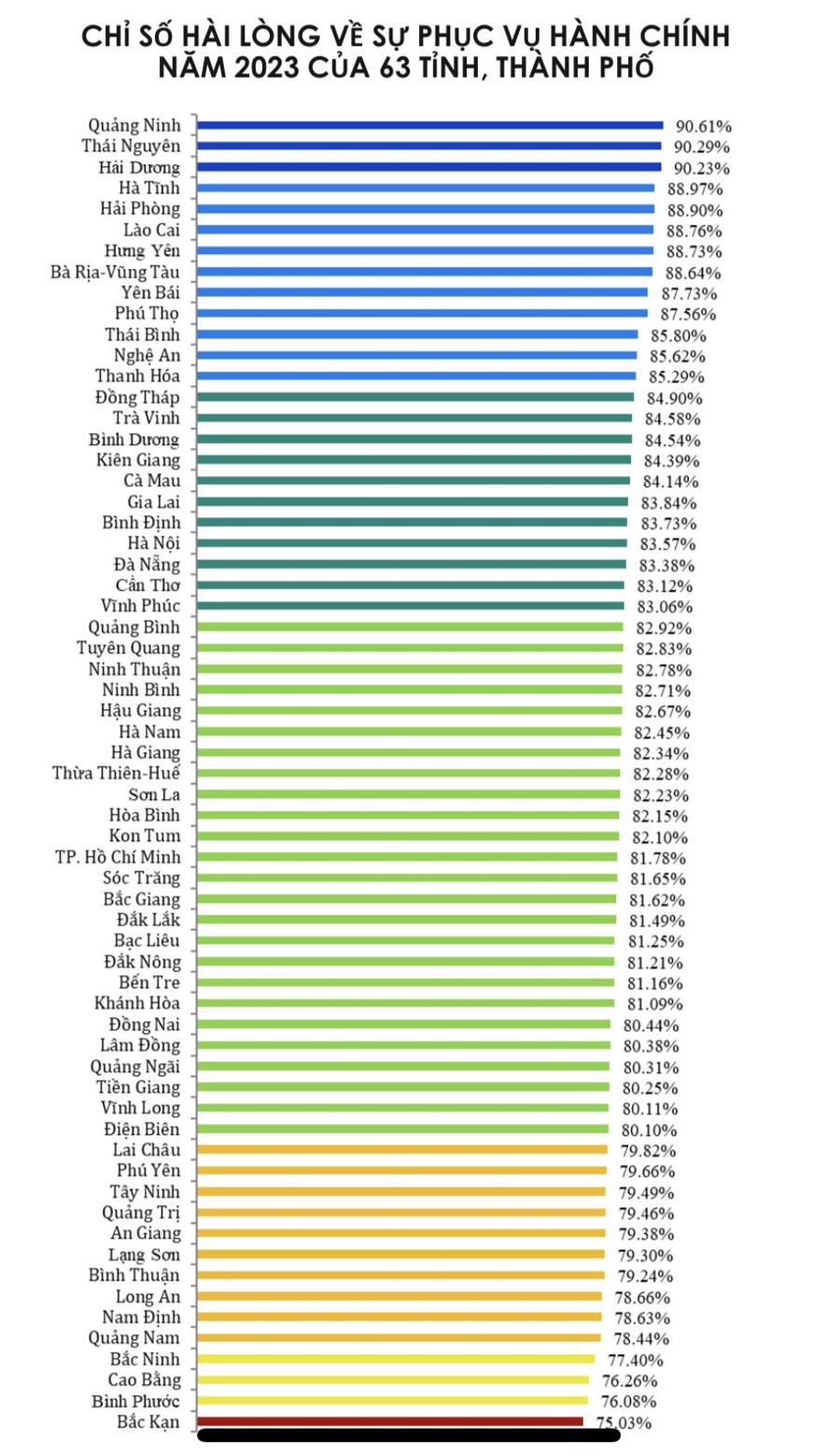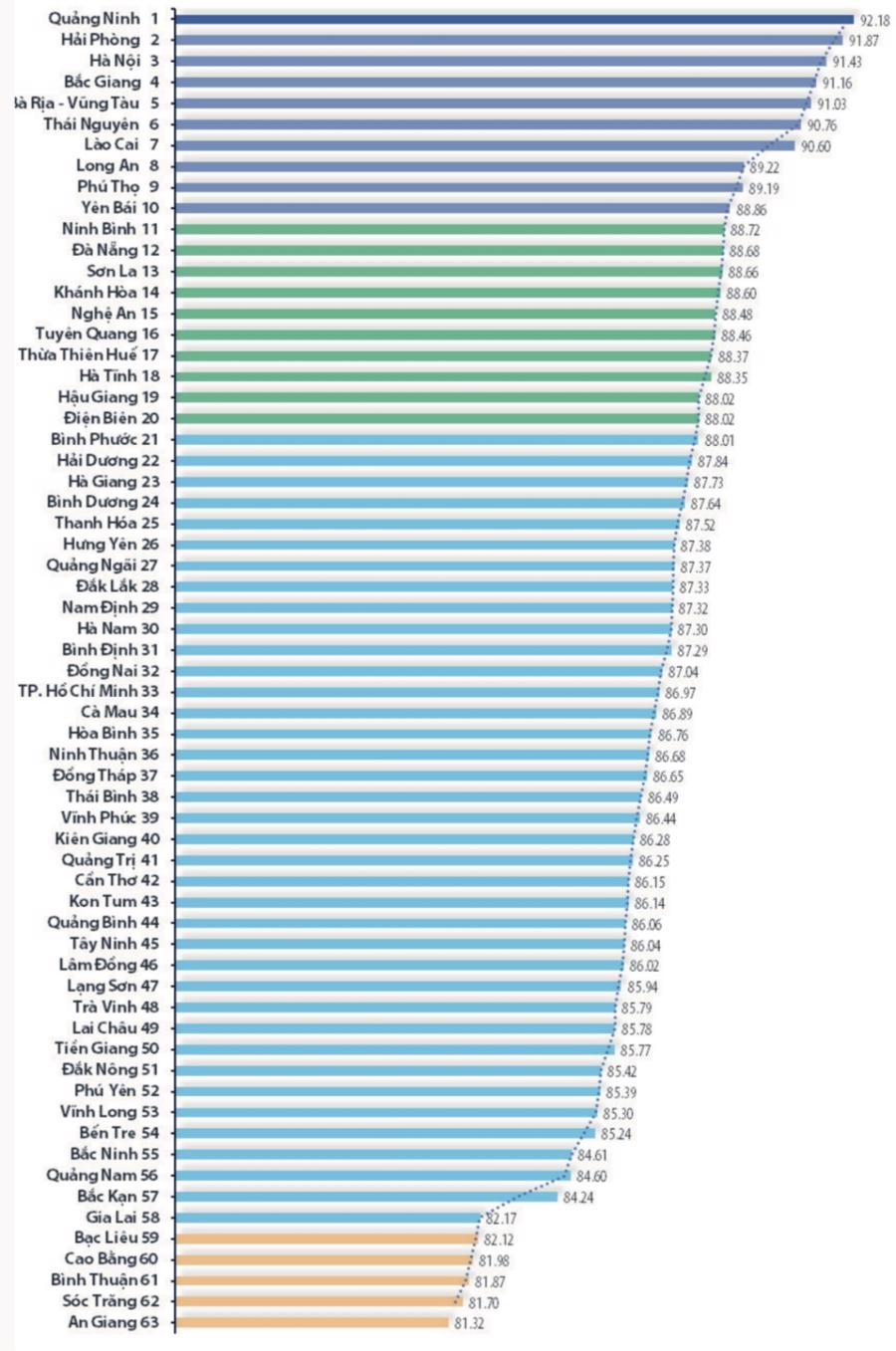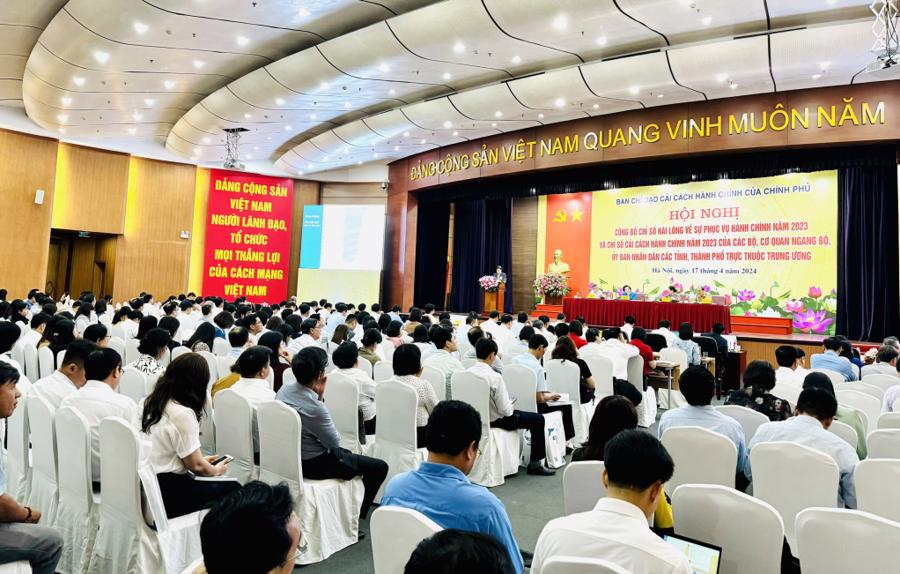On April 17, the Ministry of Home Affairs, the Steering Committee for Administrative Reform of the Government, presided over and coordinated with relevant agencies to organize a conference announcing the 2023 Satisfaction Index on Administrative Service Provision (SIPAS 2023), the 2023 Administrative Reform Index of ministries, ministerial-level agencies, and People’s Committees of provinces and centrally-run cities (PAR Index 2023).
The Administrative Reform Index is an effective management tool that has been issued and implemented by the Ministry of Home Affairs for the past 12th year. This Index helps the Government monitor, evaluate, and rank the annual administrative reform results of ministries, ministerial-level agencies, and People’s Committees of provinces and cities.
At the same time, this helps ministries, agencies, and localities analyze, compare, and clearly identify the achievements, limitations, and shortcomings in each content and task of administrative reform. Consequently, they can find solutions to improve, enhance the quality, and increase the efficiency of annual administrative reforms at their agencies and units.
In 2023, the Ministry of Home Affairs continued to implement the set of assessment criteria in the Project to Determine the Public Service Satisfaction Index for the period of 2021 – 2030, issued in Decision No. 876/QD-BNV dated November 10, 2022 by the Minister of Home Affairs. The newly issued Public Service Satisfaction Index includes two sets of assessment criteria for the ministerial and provincial levels.
PUBLIC SATISFACTION AND WILLINGNESS TO CONTRIBUTE POLICY SUGGESTIONS ARE STILL LOW
Announcing the results of the SIPAS Index 2023, Mr. Pham Minh Hung, Head of the Office of the Steering Committee for Administrative Reform of the Government, and Director of the Administrative Reform Department (Ministry of Home Affairs), reported that the satisfaction level of people with the service quality of state administrative agencies in 63 provinces and cities was in the range of 75.03%-90.61%.
There are five provinces and cities that received the highest public satisfaction level for the service quality of state administrative agencies in general: Quang Ninh, Thai Nguyen, Hai Duong, Ha Tinh, and Hai Phong. The five lowest localities are Bac Kan, Binh Phuoc, Cao Bang, Bac Ninh, and Quang Nam.

In 2023, the public’s expectation for the ten aspects that need improvement ranged from 83.44% to 85.12%. The three aspects that the public expected the government to improve the most were: Enhancing the spirit and service attitude of cadres, civil servants, and public employees in resolving work for the people, at 85.12%; then improving the quality of receiving and processing feedback and suggestions from the people, at 85.11%; and improving the capacity of cadres, civil servants, and public employees in resolving work for the people, at 85.03%.
Regarding the service quality of civil servants, 88.88% of surveyed people said that no civil servants caused trouble or harassment, and 90% said that no people had to pay extra money beyond regulations to civil servants to get their work done.

People surveyed nationwide were satisfied with the development and implementation of general policies at 82.49%, an increase compared to 2022 (79.72%). People were satisfied with four factors and 23 components of the content of developing and implementing policies at varying levels, with the differences between the levels not being high.
Public satisfaction with the four factors includes: Accountability of the government for policies at 81.93%; opportunities for public participation in the process of developing and implementing policies at 81.83%; the quality of policy implementation by the government at 82.49%; the results and impacts of policies at 82.74%.
Public satisfaction with the development and implementation of government policies in 63 provinces and cities ranged from 75.14% to 90.47%. There are five provinces and cities that received the highest public satisfaction level for the development and implementation of policies: Quang Ninh, Thai Nguyen, Hai Phong, Ha Tinh, and Lao Cai. The five lowest provinces are Bac Kan, Binh Phuoc, Cao Bang, Bac Ninh, and Long An.
MINISTRIES, AGENCIES, AND LOCALITIES NEED TO FOCUS ON SIX CORE TASKS
Ms. Pham Thi Thanh Tra, Deputy Head of the Standing Committee for Administrative Reform of the Government, said that after this announcement conference, based on the 2023 Satisfaction Index on Administrative Service Provision and the 2023 Public Service Satisfaction Index, she proposed that ministries, agencies, and localities focus on several core tasks.
Firstly, proactively analyze and assess the achieved results, clearly identify the causes of the low component indicators, and determine the specific responsibilities of related agencies, units, and individuals. Pay close attention to providing practical, strong, and effective solutions to improve the quality of public service provision of ministries, sectors, and localities.

Secondly, focus on information and propaganda work in the direction of directly approaching policy subjects regarding public service provision, the purpose, meaning, role, and importance of these indices. Thereby, creating a shift in awareness, consensus, support, and determination of cadres, civil servants, public employees, people, and the whole society for the public service provision that we are implementing.
Thirdly, concentrate on institutional reform, accelerate the development and completion of the legal system; remove bottlenecks in mechanisms and policies to support production and business activities and people’s lives. Develop solutions to improve the effectiveness of legal dissemination, education, and strict law enforcement.
Fourthly, continue to promote administrative procedure reform, closely linked to digital transformation, ensuring cost-effectiveness and synchronization. Review and abolish unnecessary, unsuitable, and unfeasible administrative procedures and business conditions that are hindering the development of production and business.
Focus on reviewing and simplifying administrative procedures, especially in core areas. Continue to complete the provincial, district, and commune-level Public Service Centers according to the one-door, one-stop mechanism, applying digital transformation, and improving the quality and efficiency of resolving administrative procedures for people and businesses.
Fifthly, continue to develop and complete policies and laws on the organization of the state administrative apparatus and the civil service system. Focus on reviewing, rearranging, and reorganizing the apparatus of administrative agencies and public service units to fully meet the criteria prescribed by the Government. Strengthen decentralization and delegation of authority in accordance with the management and operational capacity of each level and sector. Implement the rearrangement of administrative units at the district and commune levels according to plan.
Effectively implement mechanisms and policies in the management of the new contingent of cadres, civil servants, and public employees. Restructure the contingent of cadres, civil servants, and public employees based on job positions; reduce the payroll, improve the quality of the contingent, and reform the salary policy. Strengthen public service inspection, tighten discipline, and administrative discipline in the performance of duties and public services of cadres, civil servants, and public employees.
Sixthly, accelerate national digital transformation, build e-Government and e-Government towards digital government, digital government, develop the digital economy and digital society according to the Government’s roadmap.
In particular, focus on developing digital infrastructure and information technology infrastructure; completing national databases and specialized databases; enhancing data connection and sharing among agencies and localities















